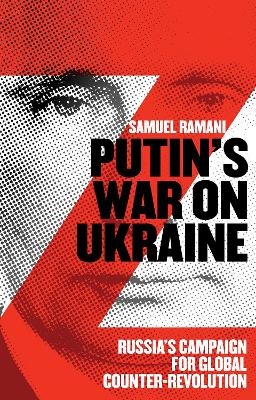
Putin’s War on Ukraine
Russia’s Campaign for Global Counter-Revolution
Seiten
2024
|
New edition
C Hurst & Co Publishers Ltd (Verlag)
978-1-80526-015-8 (ISBN)
C Hurst & Co Publishers Ltd (Verlag)
978-1-80526-015-8 (ISBN)
Why did Putin invade Ukraine?
Eight years after annexing Crimea, Russia embarked on a full-scale invasion of neighbouring Ukraine in February 2022. For Vladimir Putin, this was a legacy-defining mission—to restore Russia’s sphere of influence and undo Ukraine’s surprisingly resilient democratic experiment. Yet Putin’s aspirations were swiftly eviscerated, as the conflict degenerated into a bloody war of attrition and the Russian economy faced crippling sanctions. How can we make sense of his decision to invade?
This book argues that Putin’s policy of global counter-revolution is driven not by systemic factors, such as preventing NATO expansion, but domestic ones: the desire to unite Russians around common principles and consolidate his personal brand of authoritarianism. This objective has inspired military interventions in Crimea, Donbas and Syria, and now all-out war against Kyiv.
Samuel Ramani explores why Putin opted for regime change in Ukraine, rather than a smaller-scale intervention in Donbas, and considers the impact on his own regime’s legitimacy. How has Russia’s long-term political and foreign policy trajectory shifted? And how will the international response reshape the world order?
Eight years after annexing Crimea, Russia embarked on a full-scale invasion of neighbouring Ukraine in February 2022. For Vladimir Putin, this was a legacy-defining mission—to restore Russia’s sphere of influence and undo Ukraine’s surprisingly resilient democratic experiment. Yet Putin’s aspirations were swiftly eviscerated, as the conflict degenerated into a bloody war of attrition and the Russian economy faced crippling sanctions. How can we make sense of his decision to invade?
This book argues that Putin’s policy of global counter-revolution is driven not by systemic factors, such as preventing NATO expansion, but domestic ones: the desire to unite Russians around common principles and consolidate his personal brand of authoritarianism. This objective has inspired military interventions in Crimea, Donbas and Syria, and now all-out war against Kyiv.
Samuel Ramani explores why Putin opted for regime change in Ukraine, rather than a smaller-scale intervention in Donbas, and considers the impact on his own regime’s legitimacy. How has Russia’s long-term political and foreign policy trajectory shifted? And how will the international response reshape the world order?
Samuel Ramani is Associate Fellow at London’s Royal United Services Institute. The author of Russia in Africa and Rudderless Superpower (both published by Hurst), Samuel regularly advises the US and UK governments on international security issues, and contributes to Foreign Policy, CNN and the BBC.
| Erscheinungsdatum | 28.04.2023 |
|---|---|
| Verlagsort | London |
| Sprache | englisch |
| Maße | 129 x 198 mm |
| Themenwelt | Geisteswissenschaften ► Geschichte ► Regional- / Ländergeschichte |
| Sozialwissenschaften ► Politik / Verwaltung ► Europäische / Internationale Politik | |
| ISBN-10 | 1-80526-015-4 / 1805260154 |
| ISBN-13 | 978-1-80526-015-8 / 9781805260158 |
| Zustand | Neuware |
| Haben Sie eine Frage zum Produkt? |
Mehr entdecken
aus dem Bereich
aus dem Bereich
Erinnerungen
Buch | Softcover (2024)
Pantheon (Verlag)
CHF 22,40
Universalgelehrter, Polarreisender, Entdecker
Buch | Hardcover (2024)
mareverlag
CHF 39,20


